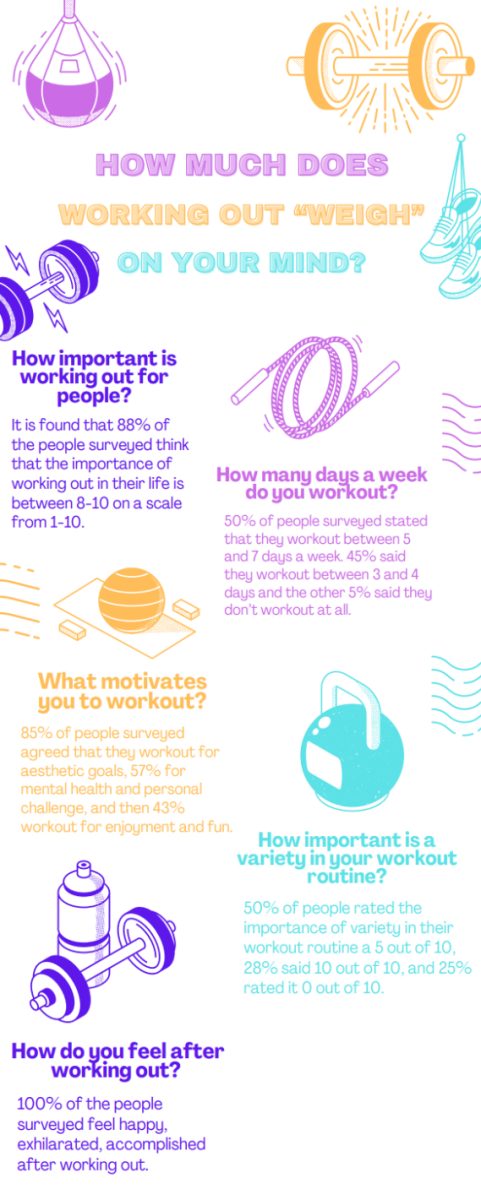The Powerful Connection Between Exercise, a Healthy Lifestyle, and Mental Health
I have witnessed firsthand how the pressures of school, social life, and future plans can weigh heavily on us. However, I’ve discovered that incorporating regular exercise and maintaining a healthy lifestyle can significantly improve mental health. In this article, I will express how working out and living healthily can positively impact our minds, helping us feel happier, more focused, and less stressed.
When we engage in physical activity, our bodies release endorphins, which are chemicals in the brain that act as mood elevators. Dynamic personal trainer, Sarah Pope explains that “When we’re exercising — whether it’s walking, running, stretching, or resistance training — our bodies go through a change in homeostasis. Movement patterns help increase oxygen and blood flow throughout the body and there is a release of endorphins, which are often referred to as the ‘feel-good hormone.” Research has also shown that regular exercise can reduce symptoms of anxiety and depression, making it an essential tool for anyone looking to boost their mental well-being. Exercise can also help us develop better coping mechanisms. Former bodybuilder and health enthusiast Arnold Schwarzenegger, states that “Training gives us an outlet for suppressed energies created by stress and thus tones the spirit just as exercise conditions the body”. For example, when faced with a tough exam or a difficult life occurrence, having the confidence built through physical challenges can help us tackle these obstacles with a more positive mindset.
In addition to the psychological benefits, working out also improves our physical health, which in turn affects our mental health. When we eat well and exercise regularly, we maintain a healthy weight, have more energy, and sleep better. Good sleep is crucial for mental health, as it helps regulate our mood and cognitive brain function. In contrast, poor sleep can lead to irritability, anxiety, and difficulty concentrating, which are issues that many high school students face. A study found from students at Columbia University Department of Psychiatry found that “While insomnia can be a symptom of psychiatric disorders, like anxiety and depression, it is now recognized that sleep problems can also contribute to the onset and worsening of different mental health problems, including depression, anxiety, and even suicidal ideation.”
A healthy lifestyle extends beyond just exercise and nutrition, as it encompasses our social interactions and the environment we create for ourselves. Engaging in group activities, such as team sports or fitness classes, can create a sense of community and belonging. A study at Mayo Clinic states that “Engaging ingroups improves mental health by fostering a sense of belonging, reducing isolation, providing social support, and offering opportunities for learning and coping skills, ultimately enhancing overall well-being These social connections are vital for our mental health, as they provide support and friendship. When we surround ourselves with positive influences, we are more likely to adopt healthier habits and maintain a balanced lifestyle. It’s also essential to recognize the role of mindfulness in our overall well-being.” Many forms of exercise, such as yoga or tai chi, incorporate mindfulness practices that encourage us to focus on the present moment. This can help us become more aware of our thoughts and feelings, allowing us to manage stress and anxiety more effectively. By practicing being mindful, we can learn to respond to challenges with a calmer and more centered approach.
In addition to exercise, nutrition plays a very important role in mental health. A balanced diet rich in fruits, vegetables, whole grains, and lean proteins provides our bodies with the essential nutrients needed for higher quality brain and body function. For instance, the omega-3 fatty acids found in fish like salmon have been linked to a reduced risk of depression. Similarly, complex carbohydrates, such as those found in whole grains, can help stabilize our blood sugar levels and mood. To further prove this idea, a study through the Harvard University Health Department informs us that “Nutrition is crucial for mental health because a balanced diet provides the brain with the necessary nutrients to function optimally, including those essential for mood regulation and cognitive function, while a poor diet can lead to deficiencies and negatively impact mental well-being.”
In my own journey to living a healthier lifestyle, I have found that making small changes to my daily routine can have a significant impact on my mental health. For example, I try to incorporate physical activity into my day, whether it’s taking my dog for a walk, going to the gym and working out, or playing a sport for fun with my friends and family. Additionally, I have started to pay more attention to my diet, opting for healthier snacks instead of sugary treats that can lead to energy crashes and irritability.
In conclusion, the connection between working out, maintaining a healthy lifestyle, and improving mental health is undeniable. Throughout life, everyone faces numerous challenges that can take a toll on our emotional well-being. However, by incorporating regular exercise, eating nutritious foods, and fostering social connections, we can enhance our mental health and overall quality of life. It’s essential to prioritize our well-being, since it not only helps us navigate the stresses of life but also promotes a healthier, happier future.

The Importance of Nutrition
Nutrition plays a vital role in our lives, especially for those who are active and work out regularly. Understanding the importance of nutrition can significantly help us make better choices that enhance our overall health and fitness levels.
Nutrition is essentially the process of providing our bodies with the essential nutrients we need to function properly, which includes carbohydrates, proteins, fats, and vitamins. Each of these nutrients plays a unique and crucial role in maintaining our health. Carbohydrates serve as the body’s primary source of energy, while proteins are essential for muscle repair and growth. When we consume a balanced diet rich in these nutrients, we give our bodies the fuel they need to perform at their best during workouts and daily activities. When we engage in physical activity, our bodies require more energy and nutrients to recover and build strength effectively. Good nutrition is key to achieving our fitness goals, as it provides the necessary support for our muscles and overall performance. For example, consuming a meal that includes both protein and carbohydrates shortly after a workout can help replenish our energy stores and promote muscle recovery. This allows us to bounce back faster and be ready for our next workout session, ensuring that we stay on track with our fitness goals. Additionally, proper nutrition can play a significant role in preventing injuries. When our bodies are well-nourished, we develop stronger bones and muscles, which reduces the risk of strains and sprains. A well-balanced diet also enhances our immune system, making it easier for us to stay healthy and active, even during intense training periods.
In conclusion, nutrition is essential for everyone, but it is particularly crucial for those who lead an active lifestyle. By focusing on a balanced diet that includes a variety of nutrients, we can improve our workout performance, recover more efficiently after exercise, and reduce the risk of injuries. Therefore, it is important to remember that what you eat matters just as much as how you train. Making informed dietary choices can lead to a healthier, more active life, allowing us to reach our fitness goals and maintain our overall well-being.

The Science Behind Muscle Growth
Understanding the science behind muscle growth not only helps athletes and fitness enthusiasts optimize their training but also sheds light on how our bodies respond to physical challenges. This article will further explore the key factors that contribute to muscle growth, including the role of nutrition, and the importance of recovery.
- Muscle growth, or hypertrophy, occurs when muscle fibers increase in size, mostly due to resistance training and good nutrition.
- The process begins with mechanical tension, which is created when muscles are challenged during workouts. This tension stimulates muscle fibers, leading to micro-tears in the tissue.
- After these micro-tears occur, the body initiates a repair process. Satellite cells, which are a type of stem cell, activate and multiply. They then fuse to the damaged muscle fibers, repairing them and increasing their size.
- This repair process is driven by protein synthesis, where amino acids from dietary protein are used to rebuild the muscle fibers. This is why consuming enough protein is crucial for muscle growth.
- Hormones play a significant role in muscle growth. Testosterone, growth hormone, and insulin-like growth factors are all ways to promote muscle repair and growth in a very fast way.
- Nutrition is essential for muscle growth. A balanced diet that includes sufficient calories, protein, carbohydrates, and healthy fats supports recovery and energy levels for workouts.
- Progressive overload is key to continue muscle growth. This means gradually increasing the weight, frequency, or intensity of your workouts to continually challenge the muscles.
- Adequate rest and recovery are also vital. Muscles grow during rest, not during workouts, so getting enough sleep and allowing time for recovery between sessions is important.
- Hydration impacts muscle function and recovery. Staying hydrated helps maintain optimal performance during workouts and aids in recovery.
- Genetics can also influence muscle growth potential. Some individuals may find it easier to gain muscle mass due to genetic factors, but consistent effort and proper training can lead to significant muscle gains for everyone.
In summary, muscle growth is a complex process influenced by mechanical tension, nutrition, hormonal balance, progressive overload, and recovery. Understanding these factors can help people optimize their training and successfully achieve their fitness goals.















